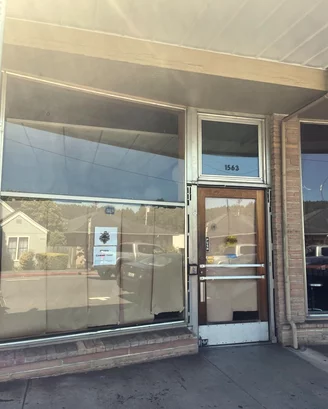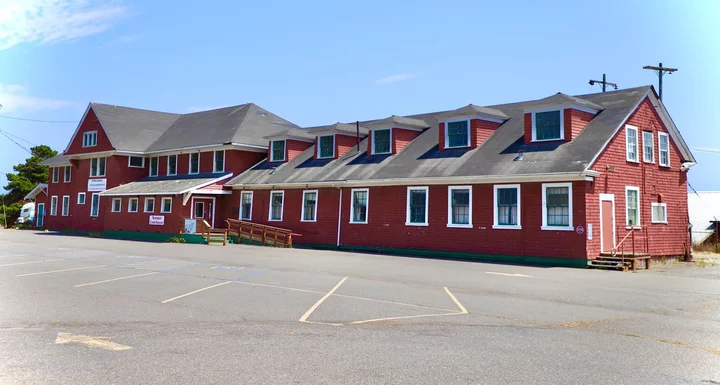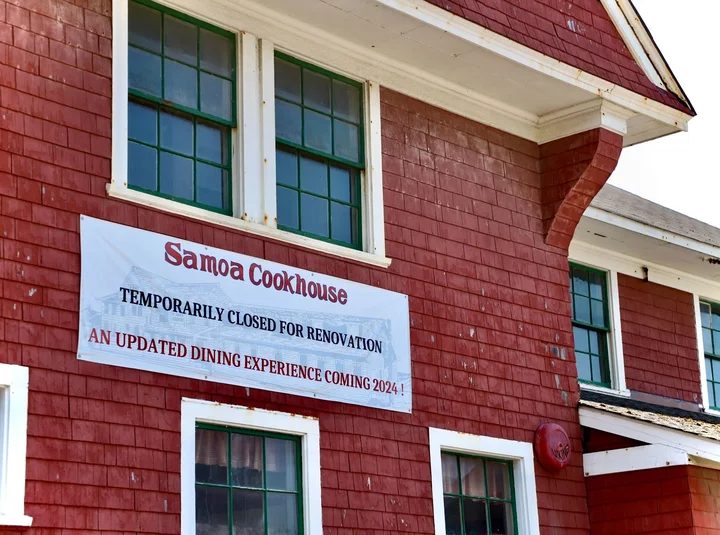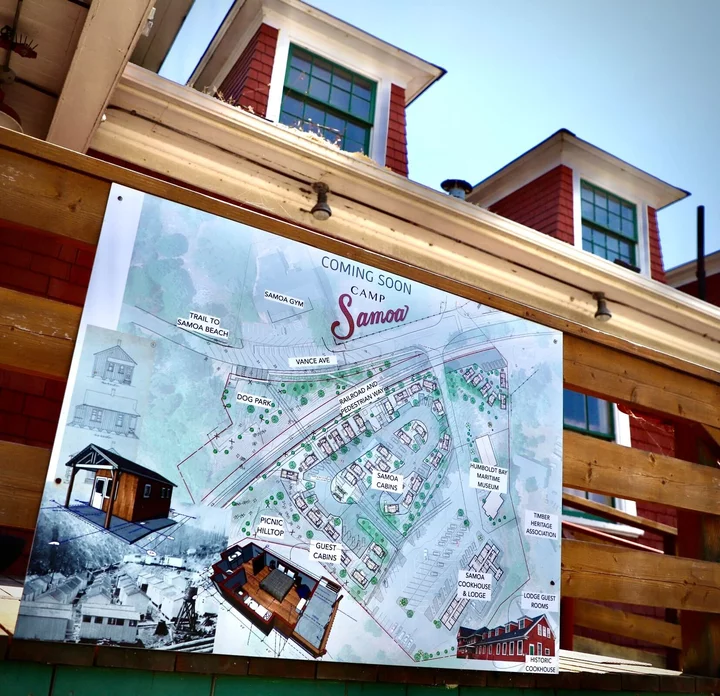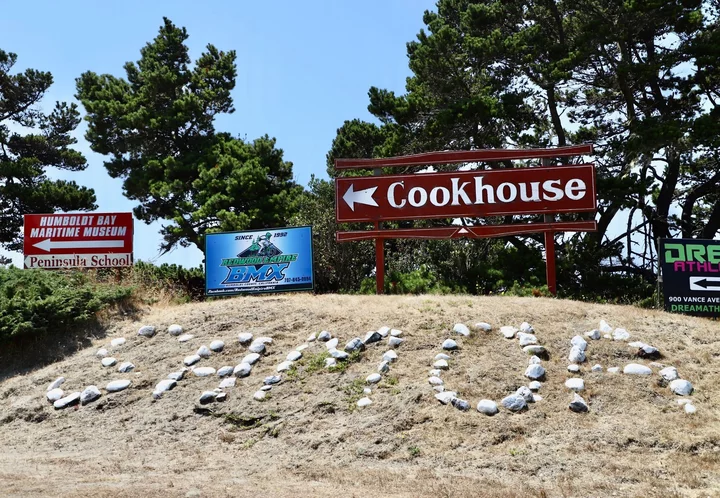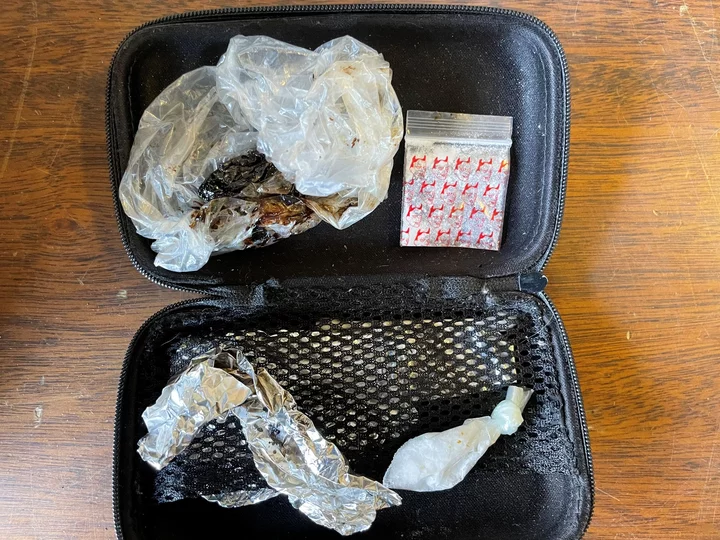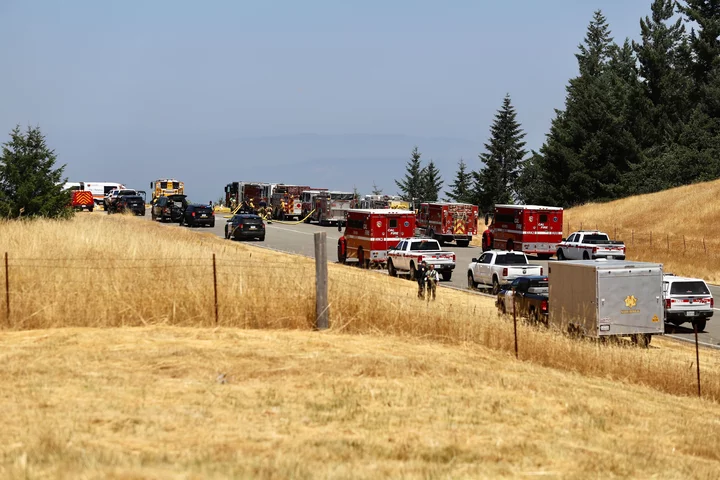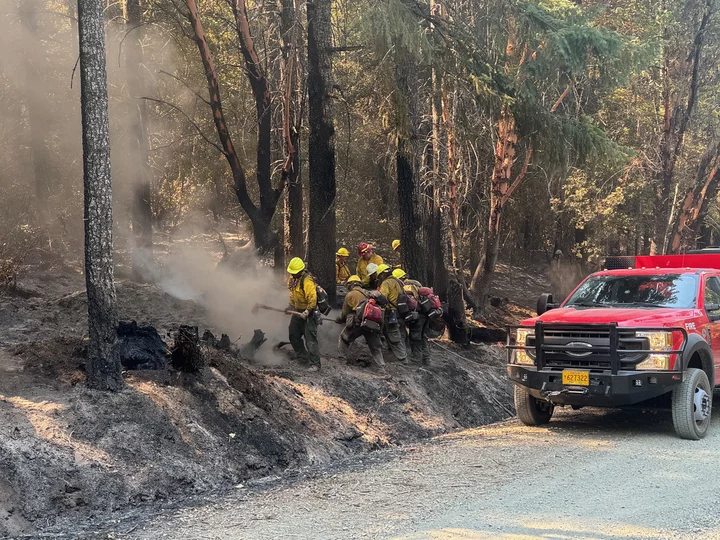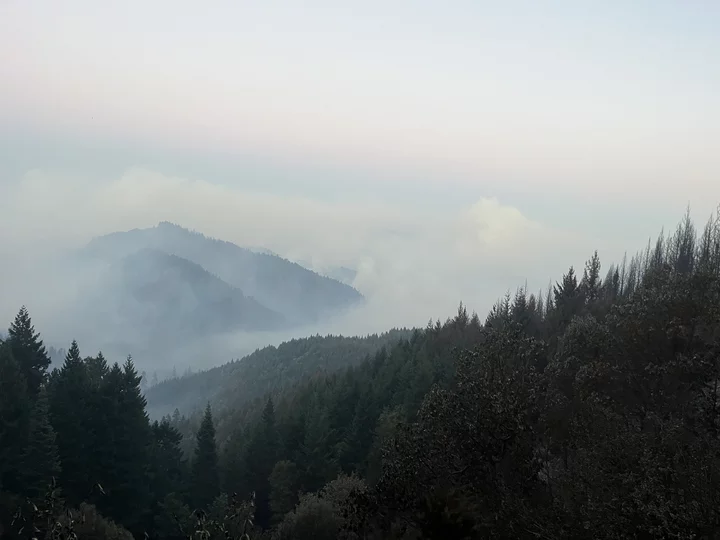Out With the Noodles, In With the Sticky Rice: Obento to Take Over Former Japhy’s Location in Northtown Arcata
Gillen Tener Martin / Wednesday, July 24, 2024 @ 2:28 p.m. / Business
Later this summer, Humboldt’s fast-casual Japanese food company Obento will open in the former G Street Arcata home of Japhy’s Soup and Noodles.
And, for all those concerned, the beloved abundance-of-veggies mural adorning the space’s south wall will stay.
“We’re so excited for this new step, and can’t wait to bring our food to the community in such a beautiful location!” Obento wrote in a July 2 Instagram post announcing the move.
The opening, planned for August or early September, will be the first time Obento offers in-person dining in its own storefront, marking a big moment in the story of a business that has faced its fair share of obstacles, as co-owner Maya Matsumoto told the Outpost in a phone interview.
Obento’s beginnings can be traced back to its owners’ childhoods. Both Matsumoto and her partner Shin Tamura grew up cooking and eating Japanese food.
“I’ve been making sushi since I was probably like 12,” said Matsumoto, adding that she originally learned the art from her grandma in Japan. After apprenticing in a Sonoma County sushi spot in high school, Matsumoto journeyed north to attend Humboldt State and continued working in restaurants locally, including Hana (a Japanese fusion Eureka restaurant that closed permanently in 2020) and the Diver Bar & Grill.
As for Tamura, “Shin likes to say he was born in a restaurant in Japan, moved to California and continued growing up in a Japanese restaurant,” Obento’s website states.
Like Matsumoto, Tamura also came north for Humboldt State, and, after they met, the partners realized they shared a fantasy of owning a Japanese restaurant.
“It had always been kind of a conversation, in the back of our heads,” Matsumoto recalled. “But then one day, we were like, ‘Hey, what if we actually, really tried to do this?’ Like, ‘What would our name be? What would our menu be like?’”
So, in 2019, Obento got its start in the City of Arcata’s Foodworks culinary facility, a site that’s spawned many iconic local businesses – from Humboldt Hot Sauce to Desserts On Us (creator of Lacey’s Cookies).
Initially, the company catered lunches solely to offices – a business model made difficult by the onset of the COVID-19 pandemic, which shuttered most workplaces the following year.
Photo: Obento via Instagram.
After a period of closure and regroup, Obento re-opened in fall 2020 as a “ghost kitchen,” with customers placing orders over the phone, through their website or via DoorDash. The following year, the business moved into the Depot on Cal Poly Humboldt’s campus.
“It’s cool to be connected to the campus and the students,” Matsumoto said of the return to their alma mater.
Matsumoto said that the university’s early closure this spring in response to student protests led to an unexpected loss of sales and product for Obento, giving her and Tamura an added push to find an off-campus location (a plan already semi-in the works).
After Japhy’s, an Arcata mainstay for 25 years, announced their closure on Instagram – spurring a flood of comments such as “I CAN’T LIVE WITHOUT YOUR CHICKEN CURRY” – Matsumoto said that the esteemed noodle spot’s former owners Josh and Miwa reached out to Obento about the open space.
“They wanted it to pass on to a business they had confidence in,” she said. “We did tell the former owners that we would keep the mural, but we’ll probably do a little bit of painting on the other side and add more decor and lighting to make it our own.”
Along with lunch and dinner seating, the G Street location will continue to offer Obento’s signature grab-and-go, bento box-style dining, inspired by Japanese Family Mart-type stores and the “authentic and affordable” motto that has always been core to the business.
“A big reason we started Obento was to showcase that Japanese food doesn’t need to be so expensive. There’s a kind of thought process around going out to eat sushi that it’s kind of a fancy thing…And it really doesn’t need to be like that,” Matsumoto said. “Japanese people eat Japanese food all the time, every day, and there are a lot of dishes besides sushi that are delicious and inexpensive and that can be a little bit more casual.”
“We have a lot of really great sushi places in town that have a sit-down feel and a lot of very fancy things on the menu,” she continued. “I think that side has been covered in Arcata.”
Obento’s Northtown location will create about ten new staff positions, according to Matsumoto, and the business will continue to serve at the Depot this school year.
“Good luck Maya and Shin,” Japhy’s wrote on Instagram, “We can’t wait to eat there.”
Credit: Obento/Maya Matsumoto.
BOOKED
Today: 12 felonies, 20 misdemeanors, 0 infractions
JUDGED
Humboldt County Superior Court Calendar: Friday, Jan. 9
CHP REPORTS
Sr3 / Deerlick Springs Rd (RD office): Animal Hazard
ELSEWHERE
RHBB: Power Out to Customers Near Ferndale May Be Connected to Traffic Collision
RHBB: Army Chinook Helicopter Draws Attention During Flight Over North Coast
The Guardian: ‘The last actual hippie’: musicians pay tribute to the Grateful Dead’s Bob Weir
The Guardian: Kristi Noem vows to send ‘hundreds’ more agents to Minneapolis as protests erupt across US
What’s Going on With the Samoa Cookhouse? Danco Owner Dan Johnson Says Reopening is Still a Couple Years Away
Jacquelyn Opalach / Wednesday, July 24, 2024 @ 1:39 p.m. / Business
The Samoa Cookhouse. Photos: Andrew Goff
Back in May 2023, the Samoa Cookhouse and Danco Group announced that the old and beloved restaurant was to temporarily close, and unveiled renovation plans for “Camp Samoa,” an overnight tourist destination. While preserving the 133-year-old establishment’s “distinctive character,” Danco promised a spiffed-up restaurant with a hostel upstairs, cabins and campsites outside, and a picnic area and dog park nearby.
The plans came with no specific timeline, and more than a year after the Cookhouse closed its doors, there is no indication that the sweeping renovations mapped out by Danco are underway.
A banner posted on the building says that an “updated dining experience” is coming in 2024, and the Samoa Cookhouse Yelp page says the business is scheduled to reopen on May 10, 2025. Fans of the restaurant have taken to commenting on old Samoa Cookhouse Facebook posts to ask when it’ll reopen, without luck.
In a recent phone call, Danco owner Dan Johnson told the Outpost that it’s looking more like 2026, and that construction is yet to begin.
Why the wait?
Architects continued tweaking the designs for months after the restaurant closed, and Danco didn’t submit a permit proposal to the Humboldt County Planning and Building Department until a few months ago, Johnson said. The proposal was initially denied because it didn’t meet the California Coastal Commission’s conditions of approval, and Danco is now revising it. Johnson guessed it will be approved in two or three months.
Danco will probably break ground in early 2025. Johnson said the work will take 18 months, pushing the opening date to around spring 2026. The building requires “quite a bit of an upgrade,” he said, not to mention the construction of 40 new cabins.
“It’s been a bit of a challenge to get to this point,” Johnson said.
The cookhouse property – along with the rest of the town of Samoa – is owned by the Samoa Pacific Group, of which Johnson is a principal owner. But the Samoa Pacific Group didn’t own the Samoa Cookhouse (the business, that is) until a couple of years ago. It used to belong to Redwood Restaurants – a company that owns Fresh Freeze, a ‘50s diner in Eureka, and Café Marina, over on Woodley Island – which sold the business to Danco a couple of years ago, a Redwood Restaurants representative told the Outpost.
But Johnson said it wasn’t so clean: the former owners didn’t renew their lease, he said, and “basically by default gave up the restaurant.”
The Samoa Pacific Group is “not really excited about being in the restaurant business,” Johnson said. The new owners opted to close the Samoa Cookhouse for renovations after running it for six months or so.
Cookhouse staff told the Outpost at the time that they were blindsided by the temporary closure. Employees learned they were out of a job the same day Danco announced the news to the public, and the restaurant closed immediately.
“All the employees were well taken care of in ensuring that they had good severance packages,” Johnson said, adding that Danco will likely consider rehiring former employees (if they’re still interested three years later, that is). He also said selling the business might be on the table, if a good opportunity pops up after the grand reopening.
Although Danco announced detailed plans for Camp Samoa just last year, intentions to glam up the cookhouse property have been sitting on the company’s back-burner for more than a decade. The renovations are a part of the Samoa Town Master Plan, Danco’s blueprint – first drafted up in 2002 – to build up Samoa’s commercial offerings, update its housing stock and expand its public spaces and facilities. In 2010, the California Coastal Commission required Danco to add low-cost visitor serving units to the plan, identifying the Samoa Cookhouse as a site for that development from the outset.
Camp Samoa will include 75 accommodations: 40 cabins, 15 campsites and 20 hostel rooms, which will lean into the second floor’s former brothel look, Johnson said.
As for changes to the restaurant? A liquor license, Johnson said, and more options on the menu.
Mill workers ate every weekday meal at the Samoa Cookhouse back when it opened in 1890. For the most part, the restaurant honored that dining experience throughout its ongoing service in the century-plus since – offering family-style meals with just one option for breakfast, lunch and dinner every day. Before it closed for renovations, the Samoa Cookhouse was – or is? – the only lumberjack cookhouse left in the United States.
When the Samoa Cookhouse announced its impending renovations on Facebook, commenters begged the restaurant not to change too much. Johnson said the goal is to hold onto the cookhouse’s famous family-style experience. “It’ll generally be the same,” he said.
At any rate, it’ll be a couple of years before dedicated Samoa Cookhouse customers can make that judgment for themselves.
Search of Convicted Felon’s Eureka Home Finds Lots of Illegal Guns and Drugs, Says Humboldt County Drug Task Force
LoCO Staff / Wednesday, July 24, 2024 @ 11:45 a.m. / Crime
Images via HCDTF.
###
Press release from the Humboldt County Drug Task Force:
On July 24th, 2024, Agents with the Humboldt County Drug Task Force served a search warrant on Dustin Cody Pool (age 42), and his residence located in 3200 block of Ingley Street in Eureka. During the month of July, the HCDTF received information that Pool was selling large quantities of narcotics and he was in possession of several firearms. Pool is a convicted felon for narcotics- and firearm-related offenses.
Upon HCDTF’s arrival at Pool’s residence, Agents learned that he was not on scene. Agents searched Pool’s residence and located three handguns, a non-serialized P80 pistol with a fully automatic switch, a non-serialized AR-15, two non-serialized AR-15 short barreled rifles (SBR), one sawed off shotgun, a .22 caliber rifle, a fully automatic AK-47, multiple high capacity magazines for pistol, AR-15 and AK-47 style firearms, thousands of rounds of miscellaneous ammunition, approximately five grams of heroin, and approximately five grams of cocaine.
The HCDTF will be submitting a case to the Humboldt County District Attorney’s Office and requesting an arrest warrant for the following charges on Pool:
- 1370.1(A) PC: Possession of a controlled substance while armed with a loaded firearm
- 29800(a)(1) PC: Felon in possession of a firearm
- 30305(a)(1) PC: Felon in possession of ammunition
- 33215 PC: Possession of sawed-off shotgun/short-barreled rifle
- 30605 PC: Possession of an assault weapon
- 24610 PC: Possession of an undetectable firearm
- 32525(a) PC: Possession of a machine gun
- 32625 PC: Unlawful conversion of a firearm to a machine gun
Anyone with information related to this investigation, including Pool’s whereabouts, or other narcotics related crimes are encouraged to call the Humboldt County Drug Task Force at 707-267-9976.
Two Killed in Kneeland Plane Crash, Sheriff’s Office Confirmed; Additional Details Released
LoCO Staff / Wednesday, July 24, 2024 @ 10:34 a.m. / Crime
Photo: Andrew Goff
PREVIOUSLY:
Press release from the Humboldt County Sheriff’s Office:
On July 23 at approximately 11:15 AM, Humboldt County Sheriff’s Office (HCSO) Deputies, Fire Services, and Emergence Medical Services (EMS) were dispatched to the Kneeland Airport for the report of a fire and possible aircraft crash.
CAL FIRE personnel arrived on scene first and reported a fire and wreckage area in a steep ravine north of the airstrip. Deputies arrived on scene to assist and secure the scene. Sadly, two confirmed fatalities were located within the wreckage. The bodies were recovered and subsequently transported to the HCSO Coroner Station, where an autopsy will be performed in the coming days.
The HCSO would like to thank their Search and Rescue (SAR) Volunteers, CAL FIRE, the California Highway Patrol (CHP), the Humboldt County Aviation Department, Humboldt Bay Fire (HBF), the Arcata Fire Department (AFD), the Blue Lake Volunteer Fire Department (BLVFD), the Kneeland Fire Protection District (KFPD), Reach Air Medical Services, and City Ambulance for their assistance and collaborative response.
The HCSO would also like to send their sincere condolences to the families of those lost in this tragic incident. Identification of the victims is pending notification of next of kin.
The HCSO has turned the crash site over to the National Transportation Safety Board (NTSB) and the Federal Aviation Administration (FAA) to investigate this incident. All further inquiries regarding the crash should be directed to them. The NTSB can be contacted at 1(202)314-6000.
Hill Fire Revised to 6,623 Acres, Now 10 Percent Contained; Community Meeting Tonight in Willow Creek
Isabella Vanderheiden / Wednesday, July 24, 2024 @ 10:33 a.m. / Fire
Photos: Hill Fire Incident Command Flickr
###
As of Wednesday morning, the Hill Fire burning near Willow Creek is 10 percent contained and its size has been revised to 6,623 acres, according to an update from Incident Command.
Crews will continue to monitor containment lines along the western and northern edges of the fire. Air resources will focus directly on a spot fire on Sugarloaf Mountain.
“Spotting was observed on Sugarloaf Mountain, prompting firefighters to strategically reposition resources to work on containment,” according to Incident Command. “Crews are working the spot fire from the north and south, with the support of aircraft, and actively engaging the fire directly to achieve containment.”
The Incident Command team will host a community meeting tonight at 7 p.m. at the Willow Creek Bible Church — 39 Brannon Mountain Road in Willow Creek. The meeting will be streamed live on the 2024 Hill Fire Facebook Page.
The following additional information comes from Incident Command:
CURRENT SITUATION:
Yesterday, as local temperatures increased, firefighters worked tirelessly on the Hill Fire. On the southern perimeter, constructed lines held, and additional depth was achieved by focusing on areas of unburned fuel.
Along the western and northern edges, crews diligently monitored previously contained areas and conducted mop-up operations to address hotspots. Crews connected handlines surrounding pockets of heat north of the fire, with ongoing efforts to extinguish these areas in the coming days fully.
Spotting was observed on Sugarloaf Mountain, prompting firefighters to strategically reposition resources to work on containment. Crews are working the spot fire from the north and south, with the support of aircraft, and actively engaging the fire directly to achieve containment.
Today, crews and air resources continue to focus directly on the spot fire located on Sugarloaf Mountain. Meanwhile, on the west side, crews are engaged in mop-up operations and patrolling the area to ensure containment.
There will be a community meeting tonight at the Willow Creek Bible Church at 7:00 PM.
WEATHER:
A passing upper-level shortwave will help ease heat today and slightly increase relative humidity. Expect smoke to lift more than previous days with inconsistent smoke transport out of the area. Winds will battle from southeast in the morning to west in the afternoon, with infrequent and inconsistent gust up to 20 mph. Winds will be heavily terrain influenced. A slight chance of thunderstorms will continue through the early afternoon with any storms most likely to be dry, isolated, and fast moving.
EVACUATIONS: Evacuation order and warnings remain in effect. For current updates on evacuations, visit https://www.facebook.com/HumboldtSheriff and https://humboldtgov.org/2383/Current-Emergencies.
Conditions are subject to change at any time, visit https://protect.genasys.com/search for a full zone description. Sign up for Humboldt Alert emergency notifications at https://humboldtgov.org/2014/Emergency-Notifications
CLOSURES:
Forest Closure Order currently in effect for the area impacted by the Hill Fire. It is temporarily prohibited to be on any national forest system land, trail, or road within the closure area.
To view the closure order and map of closure area visit the following link www.fs.usda.gov/Internet/FSE_DOCUMENTS/fseprd1191963.pdf.
Road closures are currently in place on Friday Ridge Rd. at Forest Service Route 6N06, Friday Ridge Rd. at Forest Route 5N01 and Friday Fridge Rd. at Forest Route 5N04. For updated road closure information, visit protect.genasys.com or humboldtsheriff.org/emergency.
FIRE RESTRICTIONS:
Forest fire restrictions also went into effect on July 12th . Campfires and stove fires are restricted to those developed areas listed in the forest order located at https://www.fs.usda.gov/Internet/FSE_DOCUMENTS/fseprd1188610.pdf.
Smoking, welding, and operating an internal combustion engine also have restrictions in place.
###
OBITUARY: Nancy Ann Brunson, 1939-2024
LoCO Staff / Wednesday, July 24, 2024 @ 7:34 a.m. / Obits
Nancy Ann Brunson, age 85, passed away peacefully at home on July 14, 2024. She was born
on May 22, 1939, in Longview. Nancy lived a life filled with love and dedication to her
family, church, and community.
Nancy was raised by her caring parents, Prudence (Brundin) and Rodger Comstock, who instilled in her strong values and work ethic. She graduated from Humboldt State University and pursued a teaching career. Nancy joined Beta Sigma Phi, here she made amazing friends. She married Ronald Brunson in 1958, and together they raised two talented sons. Nancy was a proud member of both the Yurok and Tolowa tribes. She and her cousin, Gene Brundin, loved telling stories about their family heritage.
She had a remarkable career as a Home Economics teacher, where she was known for her professionalism and dedication. Her colleagues and students admired her not just for her skills, but for her genuine care and concern for those she worked with. She inspired many students with her passion for cooking and sewing. Her quilts, bags, and embroidery were works of art. She continued to work at Boyd’s Sewing after she retired from teaching, sharing her talent with others.
Outside of her professional life, Nancy had a variety of interests. Nancy loved to sew, cook, play the piano, and garden. She enjoyed traveling, often visiting Lake County and Washington State to spend time with relatives.
Nancy was a woman of faith, treasuring the many friends she made in The Church of Jesus Christ of Latter Day Saints. She also enjoyed singing in the church choir. Her strong beliefs brought her much comfort throughout her life.
Nancy, and her husband Ron, were instrumental in establishing the skating rink in Blue Lake, a place that brings joy and activity to the community. Nancy was an active member of the Mad River Grange. She spent many evenings playing dominoes with her friends at the grange. She also cherished the time spent camping with Ron and their sons, Randy and Kevin, creating lasting memories in nature.
Nancy is survived by her sister, Jean Martin (Wes); her brother, Charlie Comstock; her sister-in-law, Joanne Comstock; and numerous nieces, nephews, cousins, and dear friends. She was preceded in death by her beloved spouse, Ronald Brunson; her sons, Randal Brunson and Kevin Brunson; and her brother; Peter Comstock.
Her family would like to extend their gratitude to all of the caregivers, especially Todd Martin, and the medical staff who provided her with excellent care.
A memorial service to celebrate Nancy’s life will be held on August 1, 2024, at 3 p.m., at The Church of Jesus Christ of Latter Day Saints, 1660 Heartwood Dr, McKinleyville. All are welcome.
###
The obituary above was submitted on behalf of Nancy Brunson’s loved ones. The Lost Coast Outpost runs obituaries of Humboldt County residents at no charge. See guidelines here.
OBITUARY: Joseph Alfred McCovey, 1998-2024
LoCO Staff / Wednesday, July 24, 2024 @ 7:26 a.m. / Obits
Joseph
Alfred (Hurkie) McCovey was born on August 24,1998, and was
tragically taken from us on July 19, 2024, at the young age of 25.
Hurkie was born in Eureka and grew up along the Trinity and Klamath Rivers. He was a proud Hupa, Karuk and Yurok man, and was a member of the Yurok Tribe. He attended Hoopa Elementary and Hoopa High School and enjoyed playing baseball and basketball. Hurkie loved hunting, fishing, eeling and doing anything outdoors. Most of all, he loved being with his family, and he loved his boys more than anything. His greatest joy was being their dad. If you were looking for him, you’d find him with his parents, Terry and Julie Ann. He was his mom’s love bundle.
Hurkie was the youngest of all his siblings and first cousins and was the baby of our family. He was the definition of a grandma’s boy and shared a special relationship with his Grandma Judy. They had coffee together every morning from the time he learned to crawl up the hill to her house. Hurkie was an old soul, with a beautiful heart, who will be missed forever by those who loved him. Our world is not the same without him.
Hurkie is survived by his parents, Terrance and Julie Ann McCovey, his grandmother, Julia Farnum, his children, Odell, Joseph and Julian McCovey; siblings Ruby (Phillip), Terrance Jr, and Dorothy McCovey, Natalie (Brandon) Scott, Brammel, McKenzie (Monte), Stanley III (Weeya) McCovey, and Florence Peters. His nieces and nephews; LaDayle, Ramona, Gary, Chey, Farron, Tishawnik, Shawn, Chemooch, Deja, Keyla, Eugene, Credence, Cynthia, Teressa, Terrance III, Curtis, Miles, Liam, Tristan, Atuyuriam, Bessie, Keech, Ike, Thaddius, Mark, Peyton, Cooper, Lailie, Lovella, Wyatt, Natalia, Myra, Clara, Ben, Stanley IV, and Barthel. He is also survived by his aunts, Marilyn Powell, Cynthia Henderson, great-aunts Claudette Rogers and Sylvia Carroll, his great-uncle Victor Starritt and his cousins and great nieces and nephews, too many to mention.
Hurkie is preceded in death by his grandparents Julia Starritt Trejo and Stanley “Cart” McCovey, Sr, and Byron Grant, Sr; his siblings Bessie McCovey and Duane Van Pelt III, his uncle’s Dean Powell, Barry McCovey, Sr, Farron McCovey, Sr, Stanley McCovey II and his nephew Phillip Coleman II.
Services will be held Saturday, July 27 at 1 p.m. at the Neighborhood Facilities (NF) Building in Hoopa, CA. Burial will be at the family cemetery in Orleans, CA, with a reception immediately following at the Karuk Tribe’s Department of Natural Resources (DNR) building.
Pallbearers are Chiefy, Brammel and Stanley “Boy” McCovey, Gary Juan III, Shawn and Chemooch Logan, Eric Phines, John Acuna, Tahn and Mawah’che Blake, Kenek Turner, Logan and Delmer Ferris, Farron and Harwood McCovey, Perry Sanderson, Nah-tes and David Jackson, Kistay and Donald Powell, Dellavin McCovey and Barry McCovey, Jr.
Honorary Pallbearers are Charlie, Inker, Gordon, Mikey, Long Gone, Cogy, Kit, Buck, Romeo, Kitsay, Cash, Howie, Touch and Juju McCovey, Ron and Butchie 2nd Place Reed, Robert Starritt, Boyd Ferris, Shawn Turner, Phillip Coleman, Anthony Rogers, Martin Cervantes, Emmanuel Bussell, Alfie Bussell, Hurk and Wade Nixon, Punky Colegrove, Ben Hunsucker, Rick Sanderson, Waymond and Victor Starritt, Willie Willson, Tony King, Sam Jones, Wilson Donahue, Johnny Pratt, Robert Hostler, Alex Lamebear, Sebastian Ferris, Billy Buck Peters, Arden McCovey and Sport Surber. We know Hurkie had a lot of pards, and we are truly sorry if we missed any of you!
###
The obituary above was submitted on behalf of Joseph McCovey’s loved ones. The Lost Coast Outpost runs obituaries of Humboldt County residents at no charge. See guidelines here.

